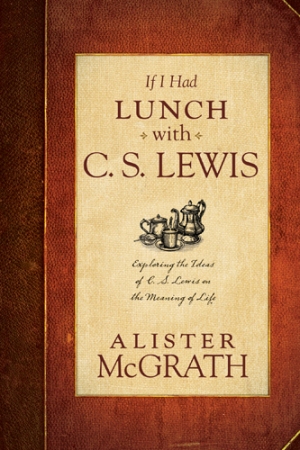I’ve had lunch with C.S. Lewis many times — when I first read his Mere Christianity and The Screwtape Letters as a young adult, and even as a child when I wasn’t supposed to read at the table, that didn’t stop me from dreaming about Aslan and the land of Narnia.
So I was intrigued by Alister McGrath’s If I Had Lunch with C.S. Lewis: Exploring the Ideas of C.S. Lewis on the Meaning of Life (Tyndale House Publishers, 2014).
This book gives an excellent overview of C.S. Lewis’s thought — from friendship to dealing with pain to the importance of story to apologetics. Just as Lewis had a gift of explaining difficult concepts with engaging clarity, so McGrath has a gift in distilling and explaining Lewis.
Well written and well thought out, this is a very civilized lunch that skirts around the socially awkward questions about Lewis’s disagreements with fellow Inkling J.R.R. Tolkien, and his relationship with Mrs. Moore as a friend and possibly more. These and other questions about Lewis’s life would have made this a different kind of lunch and a different kind of book.
Here are some of my favourite parts of this lunch of ideas with Alister McGrath and C.S. Lewis:
On life and meaning, McGrath distilling Lewis (page 20):
Life is about more than just understanding things; it is about being able to cope with ambiguity and bewilderment, and about finding something worthwhile to give us direction and meaning.
A quote from Lewis’s sermon, The Weight of Glory (page 24):
There are no ordinary people. You have never talked to a mere mortal.
On C.S. Lewis and his friends (page 46):
To challenge the status quo demands fellowship and commitment.
On the challenge of Christianity in Lewis’s time and today (page 60):
Christianity has to show that it can tell a more compelling and engaging story that will capture the imagination of its culture.
On the Lordship of Christ over theology (page 96):
It’s too easy to imprison Jesus Christ within a theological cage, taming him and mastering him. Lewis reminds us that Christ masters us, and that part of our discipleship of the mind is to expand our intellectual vision and range so that we can appreciate him more fully.
On Christian hope (page 198):
Christianity doesn’t just tell us that we are sinful; it offers forgiveness. It doesn’t just tell us that we are in prison; it throws open the doors so that we can go free.
Disclosure: Tyndale House Publishers provided me with a complimentary copy of this book, but as in all my reviews, the opinions here are my own.
Writing/Reflection Prompt: If you could have lunch with C.S. Lewis, what would you want to talk about?
_____________________
for more on reading and other acts of faith,

I am currently working my way through “The Problem of Pain” and thoroughly enjoying it. Lewis is perhaps one of the most quotable Christians outside the Bible.
I haven’t actually read Lewis for some time, so was delighted to review this book and found myself highlighting quotes by both Lewis and McGrath. The book is an excellent refresher.